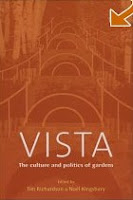Vista Lecture: James Hitchmough
 The latest Vista lecture, with James Hitchmough, professor of ecological horticulture in the Department of Landscape Architecture at Sheffield University, is available on the Gardens Illustrated website. As Noel Kingsbury says in his introduction, "Sheffield is becoming synonymous in the gardening community with some exciting new directions in planting design." This is important work that offers something to offend almost all entrenched interests, from scientific ecologists to traditional (whatever that is) garden designers.
The latest Vista lecture, with James Hitchmough, professor of ecological horticulture in the Department of Landscape Architecture at Sheffield University, is available on the Gardens Illustrated website. As Noel Kingsbury says in his introduction, "Sheffield is becoming synonymous in the gardening community with some exciting new directions in planting design." This is important work that offers something to offend almost all entrenched interests, from scientific ecologists to traditional (whatever that is) garden designers.James Hitchmough has been a leader in a new movement in gardening probably best called "enhanced nature"--plantings based on nature, mainly for use in urban settings. This is gardening for the common man and woman, not for gardening experts and aficianados, using seed-sown plantings modeled on various natural plant communities--from the North American tall grass prairie to the South African montane.
Plants are selected for their ability to remain sustainable within the overall community of plants, for flowering time, for suitability to specific ecologies and climates, and other factors related to sustainability, low maintenance, and attractiveness to the general public. Most of these gardens are in public spaces, where people who normally would not visit a garden encounter them. An important part of Hitchmough's research has been into environmental psychology, what most people consider attractive, what they like or dislike or are indifferent to in such a planting. Color, as you might think, is very important.
This research has been carried out by Hitchmough and others at Sheffield University in the UK. I've read of his work over the last several years, mainly in Noel Kingsbury's books, and it has certainly influenced my approach to gardening. (Kingsbury recently received his Ph.D. from Sheffield University, where he has worked closely with Hitchmough, Nigel Dunnet, and others.)
As you might expect, Tim Richardson, who co-hosts the series with Noel Kingsbury, and who has most recently written a book on conceptual gardens (many without plants!), gives Hitchmough a hard time. This is an entertaining hour of informal talk and stimulating Q&A.
For more information on Hitchmough's work, go to his website.
James Golden